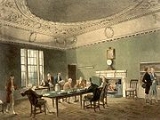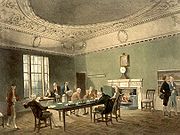
Board of Trade
Encyclopedia

Department for Business, Innovation and Skills
The Department for Business, Innovation and Skills is a ministerial department of the United Kingdom Government created on 5 June 2009 by the merger of the Department for Innovation, Universities and Skills and the Department for Business, Enterprise and Regulatory Reform .-Ministers:The BIS...
), headed by a Secretary of State for Trade and Industry (now Secretary of State for Business, Innovation and Skills), who is also President of the Board of Trade. The full Board has met only once since the mid-19th century, during commemorations of the bicentenary of the Board in 1986.
History
In 1621, King James IJames I of England
James VI and I was King of Scots as James VI from 24 July 1567 and King of England and Ireland as James I from the union of the English and Scottish crowns on 24 March 1603...
directed the Privy Council
Privy council
A privy council is a body that advises the head of state of a nation, typically, but not always, in the context of a monarchic government. The word "privy" means "private" or "secret"; thus, a privy council was originally a committee of the monarch's closest advisors to give confidential advice on...
to establish a temporary committee to investigate the causes of a decline in trade and consequent financial difficulties. The Board's formal title remains The Lords of the Committee of Privy Council appointed for the consideration of all matters relating to Trade and Foreign Plantations.
In 1696, King William III
William III of England
William III & II was a sovereign Prince of Orange of the House of Orange-Nassau by birth. From 1672 he governed as Stadtholder William III of Orange over Holland, Zeeland, Utrecht, Guelders, and Overijssel of the Dutch Republic. From 1689 he reigned as William III over England and Ireland...
appointed eight paid commissioners to promote trade in the American
United States
The United States of America is a federal constitutional republic comprising fifty states and a federal district...
plantation
Plantation
A plantation is a long artificially established forest, farm or estate, where crops are grown for sale, often in distant markets rather than for local on-site consumption...
s and elsewhere. The Lords Commissioners of Trade and Foreign Plantations, appointed in 1696 and commonly known as the Board of Trade, did not constitute a committee of the Privy Council, but were, in fact, members of a separate body. The board carried on this work but also had long periods of inactivity, devolving into chaos after 1761 and abolished in 1782 by an act of Parliament
Act of Parliament
An Act of Parliament is a statute enacted as primary legislation by a national or sub-national parliament. In the Republic of Ireland the term Act of the Oireachtas is used, and in the United States the term Act of Congress is used.In Commonwealth countries, the term is used both in a narrow...
by the Rockingham Whigs
Rockingham Whigs
The Rockingham Whigs or Rockinghamite Whigs in 18th century British politics were a faction of the Whigs led by Charles Watson-Wentworth, 2nd Marquess of Rockingham, when he was the opposition leader in the House of Lords during the government of Lord North from 1770 to 1782 and during the two...
.
By 1793, the board still remained in its old structure, with 20 members including the Archbishop of Canterbury
Archbishop of Canterbury
The Archbishop of Canterbury is the senior bishop and principal leader of the Church of England, the symbolic head of the worldwide Anglican Communion, and the diocesan bishop of the Diocese of Canterbury. In his role as head of the Anglican Communion, the archbishop leads the third largest group...
. William Pitt the Younger
William Pitt the Younger
William Pitt the Younger was a British politician of the late 18th and early 19th centuries. He became the youngest Prime Minister in 1783 at the age of 24 . He left office in 1801, but was Prime Minister again from 1804 until his death in 1806...
recreated the committee in 1784, and an Order in Council of 23 August 1786 provided the formal basis that still remains in force. A secretariat was established which included the president, vice president and board members. After 1820 the board ceased to meet regularly and the business was carried out entirely by the secretariat. The short name of "Board of Trade" was formalised in 1861.
In the 19th century the board had an advisory function on economic activity in the UK
United Kingdom
The United Kingdom of Great Britain and Northern IrelandIn the United Kingdom and Dependencies, other languages have been officially recognised as legitimate autochthonous languages under the European Charter for Regional or Minority Languages...
and its empire
British Empire
The British Empire comprised the dominions, colonies, protectorates, mandates and other territories ruled or administered by the United Kingdom. It originated with the overseas colonies and trading posts established by England in the late 16th and early 17th centuries. At its height, it was the...
. During the second half of the 19th century it also dealt with legislation for patents, designs and trade marks, company regulation, labour and factories, merchant shipping, agriculture, transport, power etc. Colonial matters passed to the Colonial Office
Secretary of State for the Colonies
The Secretary of State for the Colonies or Colonial Secretary was the British Cabinet minister in charge of managing the United Kingdom's various colonial dependencies....
and other functions were devolved to newly created departments, a process that continued for much of the 20th century.
The original commission comprised the seven (later eight) Great Officers of State
Great Officer of State
In the United Kingdom, the Great Officers of State are traditional Crown ministers, who either inherit their positions or are appointed to exercise certain largely ceremonial functions. Separate Great Officers exist for England and Scotland, and formerly for Ireland...
, who were not required to attend meetings, and the eight paid members, who were required to attend. The Board, so constituted, had little real power, and matters related to trade and the colonies were usually within the jurisdiction of the Secretaries of State
Secretary of State
Secretary of State or State Secretary is a commonly used title for a senior or mid-level post in governments around the world. The role varies between countries, and in some cases there are multiple Secretaries of State in the Government....
and the Privy Council, with the Board confining itself mainly to colonial administration.
See also
- Imperial Lighthouse ServiceImperial Lighthouse ServiceThe Imperial Lighthouse Service was the official General Lighthouse Authority for the British Empire. This was with the exception of England, Wales, Scotland, the Isle of Man, Northern Ireland, Gibraltar and the Falkland Islands, which were under the authority of Trinity House...
- Parliamentary Secretary to the Board of TradeParliamentary Secretary to the Board of TradeThe Parliamentary Secretary to the Board of Trade in the United Kingdom was a member of Parliament assigned to assist the Board of Trade and its President with administration and liaison with Parliament. It replaced the Vice-President of the Board of Trade....
- Vice-President of the Board of TradeVice-President of the Board of TradeThe office of Vice-President of the Board of Trade was a junior ministerial position in the government of the United Kingdom. The office was created in 1786 and abolished in 1867. From 1848 onwards the office was held concurrently with that of Paymaster-General...
Works cited
- Root, Winfred T. “The Lords of Trade and Plantations, 1675-1696.” American Historical Review 23 (October 1917): 20-41. online edition
- History of the Board of Trade

